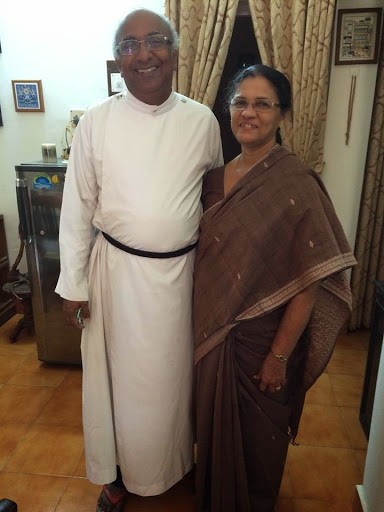By Rev. Thomas John, Mission Co-worker, Chethana, Joining Hands India
Joining Hands (JH) was launched at a time when many international funding agencies were practicing approaches that were more corporate, prescriptive and designed to be one-size-fits-all. These agencies were serving the poor, but often did so according to their own agenda, without acknowledging or empowering the potential of the poor to be the makers of their own destiny.

Rev. Thomas John with his wife Betty. Photo Credit: Andrew Kang Bartlett.
The Presbyterian Hunger Program, in realizing the disconnect between “serving the poor” and the poor themselves, decided to try a new approach to listen to partners in the South as they identified causes of hunger and poverty within their contexts, and invite churches in the North to work alongside them in addressing these issues, working hand in hand.
Here are some of the foundational principles that gave shape to Joining Hands as per my own experiences and reflections as someone who has been a part of this journey since the program started.
1. Joining Hands works within a holistic understanding of life and development, and acknowledges that material prosperity alone cannot be the goal of development. The program understands that good development works towards qualitative improvements in community life, dignity and freedom. Further, JH understands community to include all flora and fauna, in which life is sustained.
2. Hunger is a symptom of our estrangement from the core of our being, and its causes are identified within local, national and international structures of domination and exploitation. Hence, hunger must be dealt with through deeper analysis, political mobilization of the hungry, and through solidarity actions across national boundaries by those who are committed to a world of equity, justice and peace. Actions to solve hunger and poverty by those who are affluent should be done with an attitude of repentance and humility, and done in solidarity with those who are hungry.
3. JH works to identify and challenge economic systems which keep poor people poor. JH is committed to an “oikumene of solidarity” over an “oikumene of domination and exploitation”.
4. Joining Hands views the poor as agents of their own destiny, and recognizes that good intentions do not legitimize interventions to control, direct and thrust upon them development agendas, which further erode their dignity and victimize them. Hence, the programs is committed to empower the poor and encourage them to come together as in-country networks to decide their priorities, choose a course of action and thus, advance their own campaign actions in which US partners can join.
5. JH is undergirded by a deep spirituality, lived in a multi-religious, multi-racial, and multi-national context in terms of a commitment to solidarity with the poor, responsibility to God’s creation and hope in the establishment of a world of justice and peace, the Kingdom of God.
6. While financial assistance is provided to in-country networks to facilitate their campaign agenda, it is done more in the form of a sharing of resources, and with greater responsibility and accountability by providing other logistical support, close accompaniment, connections, sharing of knowledge and skills and international solidarity action. This is done within the framework of mutuality, reciprocity and solidarity, and not that of domination.
When I look back at 15 years of Joining Hands’ experience in India, and talk with colleagues working with Joining Hands networks in other countries, it is clear that this initiative is a means of living out repentance in the way of Peter and John as described in the third chapter of Acts in the Bible: 1. Establishing a relationship that goes beyond being looked at (in, perhaps, condescending ways) to one of looking at each other in the eyes (“Look at us,” verse. 4). 2. Working to alter the expectations that have been developed over years of living on the charity of the affluent (Verse.6). 3. Extend the “right hand” of fellowship and acceptance (verse 7). 4. Empowering the lame man to stand up, enter places where he has been denied entry, and claim his rights as a dignified human being (verse 8).
As we celebrate these years of partnership with Joining Hands, we also celebrate this model of being with the most deprived and vulnerable of this earth in repentance and renewal, acknowledging that they alone can lead the way for a political re-ordering of the world as it exists today. That makes JH a unique model of faithful witness in a world where the market directs life.
![]() You may freely reuse and distribute this article in its entirety for non-commercial purposes in any medium. Please include author attribution, photography credits, and a link to the original article. This work is licensed under a Creative Commons Attribution-NonCommercial-NoDeratives 4.0 International License.
You may freely reuse and distribute this article in its entirety for non-commercial purposes in any medium. Please include author attribution, photography credits, and a link to the original article. This work is licensed under a Creative Commons Attribution-NonCommercial-NoDeratives 4.0 International License.
Categories: Hunger & Poverty
Tags: India, Joining Hands, presbyterian hunger program
Ministries: Presbyterian Hunger Program, Joining Hands, Compassion, Peace and Justice